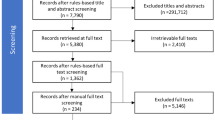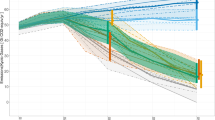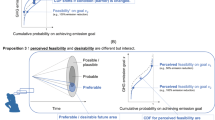Abstract
Low-carbon transitions are long-term multi-faceted processes. Although integrated assessment models have many strengths for analysing such transitions, their mathematical representation requires a simplification of the causes, dynamics and scope of such societal transformations. We suggest that integrated assessment model-based analysis should be complemented with insights from socio-technical transition analysis and practice-based action research. We discuss the underlying assumptions, strengths and weaknesses of these three analytical approaches. We argue that full integration of these approaches is not feasible, because of foundational differences in philosophies of science and ontological assumptions. Instead, we suggest that bridging, based on sequential and interactive articulation of different approaches, may generate a more comprehensive and useful chain of assessments to support policy formation and action. We also show how these approaches address knowledge needs of different policymakers (international, national and local), relate to different dimensions of policy processes and speak to different policy-relevant criteria such as cost-effectiveness, socio-political feasibility, social acceptance and legitimacy, and flexibility. A more differentiated set of analytical approaches thus enables a more differentiated approach to climate policy making.
This is a preview of subscription content, access via your institution
Access options
Subscribe to this journal
Receive 12 print issues and online access
$209.00 per year
only $17.42 per issue
Buy this article
- Purchase on Springer Link
- Instant access to full article PDF
Prices may be subject to local taxes which are calculated during checkout

Similar content being viewed by others
References
World in Transition – A Social Contract for Sustainability (German Advisory Council on Global Change, 2011).
Edenhofer, O. Climate Change 2014: Mitigation of Climate Change (Cambridge Univ. Press, 2014).
Weyant, J. P. A perspective on integrated assessment. Climatic Change 95, 317–323 (2009).
van Vuuren, D. P. & Kok, M. in Encyclopedia of Global Environmental Governance and Politics (eds Pathberg, P. H. & Zelli, F.) 119–127 (Edward Elgar, 2015).
Hamilton, S. H., ElSawah, S., Guillaume, J. H. A., Jakeman, A. J. & Pierce, S. A. Integrated assessment and modelling: overview and synthesis of salient dimensions. Environ. Modell. Softw. 64, 215–229 (2015).
Transformative Cornerstones of Social Science Research For Global Environmental Change (International Social Science Council, 2012).
Hackmann, H., Moser, S. C. & St. Clair, A. L. The social heart of global environmental change. Nature Clim. Change 4, 653–655 (2014).
Sovacool, B. K. Diversity: energy studies need social science. Nature 511, 529–530 (2014).
Weaver, C. P. From global change science to action with social sciences. Nature Clim. Change 4, 656–659 (2014).
McDowall, W. Exploring possible transition pathways for hydrogen energy: a hybrid approach using socio-technical scenarios and energy system modelling. Futures 63, 1–14 (2014).
Carrico, A. R., Vandenberg, M. P., Stern, P. S. & Dietz, T. US climate policy needs behavioural science. Nature Clim. Change 5, 177–179 (2015).
Victor, D. Embed the social sciences in climate policy. Nature 520, 27–29 (2015).
Fortes, P., Alvarenga, A., Seixas, J. & Rodrigues, S. Long-term energy scenarios: bridging the gap between socio-economic storylines and energy modeling. Technol. Forecast. Soc. 91, 161–178 (2015).
Schellnhuber, H. J., Crutzen, P. J., Clark, W. C. & Hunt, J. Earth System analysis for sustainability. Environment 47, 11–25 (2005).
Palmer, I. & Smith, M. Earth systems: model human adaptation to climate change. Nature 512, 365–366 (2014).
Olsson, L., Jerneck, A., Thoren, H., Persson, J. & O'Byrne, D. Why resilience is unappealing to social science: theoretical and empirical investigations of the scientific use of resilience. Science Adv. 1, e1400217 (2015).
Castree, N. Changing the intellectual climate. Nature Clim. Change 4, 763–768 (2014).
Castree, N. Reply to 'Strategies for changing the intellectual climate' and 'Power in climate change research'. Nature Clim. Change 5, 393 (2015).
Geels, F. W. Technological Transitions and System Innovations: A Co-evolutionary and Socio-Technical Analysis (Edward Elgar, 2005).
The Fifth Carbon Budget: The Next step Towards a Low-Carbon Economy (Committee on Climate Change, 2015).
Miller, C. A., Iles, A. & Jones, C. F. The social dimensions of energy transitions: introduction to the special issue. Sci. Cult. 22, 135–148 (2013).
Markard, J., Raven, R. & Truffer, B. Sustainability transitions: an emerging field of research and its prospects. Res. Policy 41, 955–967 (2012).
Penna, C. C. R. & Geels, F. W. Multi-dimensional struggles in the greening of industry: a dialectic issue lifecycle model and case study. Technol. Forecast. Soc. 79, 999–1020 (2012).
Kern, F. The discursive politics of governing transitions towards sustainability: an analysis of the Carbon Trust in the UK. Int. J. Sust. Dev. 15, 90–106 (2012).
Meadowcroft, J. What about the politics? Sustainable development, transition management, and long term energy transitions. Policy Sci. 42, 323–340 (2009).
O'Brien, K. Political agency: the key to tackling climate change. Science 350, 1170–1171 (2015).
Messner, D. A social contract for low carbon and sustainable development: reflections on non-linear dynamics of social realignments and technological innovations in transformation processes. Technol. Forecast. Soc. 98, 260–270 (2015).
Laird, F. N. Against transitions? Uncovering conflicts in changing energy systems. Sci. Cul. 22, 149–156 (2013).
Nye, D. E. The United States and alternative energies since 1980: technological fix or regime change? Theo. Cult. Soc 31, 103–125 (2014).
Hirsh, R. F. & Jones, C. F. History's contributions to energy research and policy. Energ. Res. Soc. Sci. 106–111 (2014).
Stern, N. Why Are We Waiting? The Logic, Urgency, and Promise of Tackling Climate Change (MIT Press, 2015).
Grubb, M., Hourcade, J.-C. & Neuhoff, K. The three domains structure of energy-climate transitions. Technol. Forecast. Soc. 98, 290–302 (2015).
Bauer, N. et al. CO2 emission mitigation and fossil fuel markets: dynamic and international aspects of climate policies. Technol. Forecast. Soc. 90, 243–256 (2015).
Kriegler, E. et al. The role of technology for achieving climate policy objectives: overview of the EMF 27 study on global technology and climate policy strategies. Climatic Change 123, 353–367 (2014).
Turnheim, B. et al. Evaluating sustainability transitions pathways: bridging analytical approaches to address governance challenges. Glob. Environ. Change 35, 239–253 (2015).
Bulkeley, H. A., Broto, V. C. & Edwards, G. A. S. An Urban Politics of Climate Change: Experimentation and the Governing of Socio-Technical Transitions (Routledge, 2014).
Seyfang, G. & Haxeltine, A. Growing grassroots innovations: exploring the role of community-based initiatives in governing sustainable energy transitions. Environ. Plann. C 30, 381–400 (2012).
Bai, X. et al. Plausible and desirable futures in the Anthropocene: a new research agenda. Global Environ. Change http://dx.doi.org/10.1016/j.gloenvcha.2015.09.017 (2015).
Staub-Kaminski, I., Zimmer, A., Jakob, M. & Marschinski, R. Climate policy in practice: a typology of obstacles and implications for integrated assessment modeling. Clim. Change Econ. (2013).
Leonard-Barton, D. Core capabilities and core rigidities: a paradox in managing new product development. Strategic Manage. J. 13, 111–125 (1992).
David, P. A. Why are institutions the 'carriers of history'? Path dependence and the evolution of conventions, organizations and institutions. Struct. Change Econ. Dyn. 5, 205–220 (1994).
Tripsas, M. & Gavetti, G. Capabilities, cognition and inertia: evidence from digital imaging. Strategic Manage. J. 21, 1147–1161 (2000).
Geels, F. W. Regime resistance against low-carbon energy transitions: introducing politics and power in the multi-level perspective. Theor. Cult. Soc. 31, 21–40 (2014).
Scrieciu, S. S., Barker, T. & Ackerman, F. Pushing the boundaries of climate economics: critical issues to consider in climate change policy analysis. Ecol. Econ. 85, 155–165 (2013).
Hajer, M. et al. Beyond cockpit-ism: four insights to enhance the transformative potential of the sustainable development goals. Sustainability 7, 1651–1660 (2015).
Schubert, D. K. J., Thuβ, S. & Möst, D. Does political and social feasibility matter in energy scenarios? Energ. Res. Soc. Sci. 7, 43–54 (2015).
World Energy Outlook 2015 (International Energy Agency, 2015).
Schmid, E. & Knopf, B. Ambitious mitigation scenarios for Germany: a participatory approach. Energ. Policy 51, 662–672 (2012).
van Sluisveld, M. et al. Comparing future patterns of energy system change in 2 °C scenarios with historically observed rates of change. Glob. Environ. Chang. 35, 436–449 (2015).
Wilson, C., Grubler, A., Bauer, N., Krey, V. & Riahi, K. Future capacity growth of energy technologies: are scenarios consistent with historical evidence? Climatic Change 118, 381–395 (2013).
van Vuuren, D. P. et al. What do near-term observations tell us about long-term developments in greenhouse gas emissions? Climatic Change 103, 635–642 (2010).
Köhler, J. A transitions model for sustainable mobility. Ecol. Econ. 68, 2985–2995 (2009).
Li, F. G. N., Trunevyte, E. & Strachan, N. A review of socio-technical energy transition (STET) models. Technol. Forecast. Soc. 100, 290–305 (2015).
Gilbert, A. Q. & Sovacool, B. K. Looking the wrong way: bias, renewable electricity, and energy modeling in the United States. Energy 94, 533–541 (2016).
Ackerman, F., DeCanio, S. J., Howarth, R. B. & Sheeran, K. Limitations of integrated assessment models of climate change. Climatic Change 95, 297–315 (2009).
Sovacool, B. K. What are we doing here? Analyzing fifteen years of energy scholarship and proposing a social science research agenda. Energ. Res. Soc. Sci. 1, 1–29 (2014).
Ritzer, G. Sociology: A Multiple Paradigm Science (Allyn and Bacon, 1980).
Hassard, J. Multiple paradigms and organizational analysis: a case study. Organ. Stud. 12, 275–299 (1991).
Collins, R. Four Sociological Traditions (Oxford Univ. Press, 1994).
Hall, J. R. Cultures of Inquiry: From Epistemology to Discourse in Sociohistorical Research (Cambridge Univ. Press, 1999).
Kagan, J. The Three Cultures: Natural Sciences, Social Sciences and the Humanities in the 21st Century (Cambridge Univ. Press, 2009).
Goertz, G. & Mahoney, J. A. Tale of Two Cultures: Qualitative and Quantitative Research in the Social Sciences (Princeton Univ. Press, 2012).
IPCC Climate Change 2014: Mitigation of Climate Change (eds Edenhofer, O. et al.) (Cambridge Univ. Press, 2014).
Gillingham, K., Newell, R. G. & Pizer, W. A. Modeling endogenous technological change for climate policy analysis. Energy Econ. 30, 2734–2753 (2008).
Farla, J., Markard, J., Raven, R. P. J. M. & Coenen, L. Sustainability transitions in the making: a closer look at actors, strategies and resources. Technol. Forecast. Soc. 79, 991–998 (2012).
Smith, A., Stirling, A. & Berkhout, F. The governance of sustainable socio-technical transitions. Res. Policy 34, 1491–1510 (2005).
Kemp, R., Schot, J. & Hoogma, R. Regime shifts to sustainability through processes of niche formation: the approach of strategic niche management. Technol. Anal. Strat. Manage. 10, 175–196 (1998).
Fuenfschilling, L. & Truffer, B. The structuration of socio-technical regimes — conceptual foundations from institutional theory. Res. Policy 43, 772–791 (2014).
Unruh, G. C. Understanding carbon lock-in. Energ. Policy 28, 817–830 (2000).
Geels, F. W. Technological transitions as evolutionary reconfiguration processes: a multi-level perspective and a case-study. Res. Policy 31, 1257–1274 (2002).
Smith, A., Voβ, J.-P. & Grin, J. Innovation studies and sustainability transitions: the allure of a multi-level perspective and its challenges. Res. Policy 39, 435–448 (2010).
Nykvist, B. & Whitmarsh, L. A multi-level analysis of sustainable mobility transitions: niche developments in the UK and Sweden. Technol. Forecast. Soc. 75, 1373–1387 (2008).
Geels, F. W., Kemp, R., Dudley, G. & Lyons, G. Automobility in Transition? A Socio-Technical Analysis of Sustainable Transport (Routledge, 2012).
Whyte, W. F., Greenwood, D. J. & Lazes, P. Participatory action research: through practice to science in social research. Am. Behav. Sci. 32, 513–551 (1989).
Kindon, S., Pain, R. & Kesby, M. Participatory Action Research: Approaches and Methods (Routledge, 2007).
Walker, G. P., Hunter, S., Devine-Wright, P., Evans, B. & Fay, H. Harnessing community energies: explaining and evaluating community-based localism in renewable energy policy in the UK. Glob. Environ. Polit. 7, 64–82 (2007).
Kerkhof, M. & Wieczorek, A. Learning and stakeholder participation in transition processes towards sustainability: methodological considerations. Technol. Forecast. Soc. 72, 733–747 (2005).
Ostrom, E. Polycentric systems for coping with collective action and global environmental change. Glob. Environ. Change 20, 550–557 (2010).
Brown, H. S., Vergragt, P., Green, K. & Berchicci, L. Learning for sustainability transition through bounded socio-technical experiments in personal mobility. Technol. Anal. Strat. Manage. 15, 291–315 (2003).
Kolb, D. A. Experiential Learning: Experience as the Source of Learning and Development (Prentice-Hall, 1984).
Petersen, A., Blackstock, J. & Morisetti, N. New leadership for a user-friendly IPCC. Nature Clim. Change 5, 909–911 (2015).
Meadowcroft, J. Planning, democracy and the challenge of sustainable development. Int. Polit. Sci. Rev. 18, 167–190 (1997).
Pemberton, H. Policy networks and policy learning: UK economic policy in the 1960s and 1970s. Pub. Admin. 78, 771–792 (2000).
Sabatier, P. Policy Change and Learning: An Advocacy Coalition Approach (Westview, 1993).
Lindblom, C. E. The science of muddling through. Pub. Admin. Rev. 19, 79–88 (1959).
Pressman, J. & Wildavsky, A. Implementation: How Great Expectations in Washington Are Dashed in Oakland: Or, Why It's Amazing that Federal Programs Work At All (Univ. California Press, 1973).
Mintzberg, H., Ahlstrand, B. & Lampel, J. Strategy Safari: A Guided Tour Through the Wilds of Strategic Management (The Free Press, 1998).
Kemp, R., Rotmans, J. & Loorbach, D. Assessing the Dutch energy transition policy: how does it deal with dilemmas of managing transitions? J. Env. Pol. Plann. 9, 315–331 (2007).
Dijk, M. & Yarime, M. The emergence of hybrid-electric cars: innovation path creation through co-evolution of supply and demand. Technol. Forecast. Soc. 77, 1371–1390 (2010).
Carter, N. & Jacobs, M. Explaining radical policy change: the case of climate change and energy policy under the British Labour Government 2006–10 Pub. Admin. 92, 125–141 (2014).
Ellis, G., Cowell, R., Warren, C., Strachan, P. & Szarka, J. Expanding wind power: a problem of planning, or of perception? Plan. Theor. Pract. 10, 521–547 (2009).
Smith, A., Kern, F., Raven, R. & Verhees, B. Spaces for sustainable innovation: solar photovoltaic electricity in the UK. Technol. Forecast. Soc. 81, 115–130 (2013).
van de Ven, A. H. Engaged Scholarship: A Guide for Organizational and Social Research (Oxford Univ. Press, 2007).
Burnes, B. Managing Change: A Strategic Approach to Organisational Dynamics (Prentice-Hall, 2009).
Kwa, C. Styles of Knowing. A New History of Science From Ancient Times to the Present (Univ. Pittsburgh Press, 2011).
Geels, F. W. Ontologies, socio-technical transitions (to sustainability), and the multi-level perspective. Res. Policy 39, 495–510 (2010).
Acknowledgements
All authors were supported by the European Union's Seventh Framework Programme (FP7/2007–2013) under grant agreement no. 603942 (PATHWAYS).
Author information
Authors and Affiliations
Contributions
F.W.G led the drafting of the text with inputs from all other authors. All authors contributed to the intellectual content.
Corresponding author
Ethics declarations
Competing interests
The authors declare no competing financial interests.
Rights and permissions
About this article
Cite this article
Geels, F., Berkhout, F. & van Vuuren, D. Bridging analytical approaches for low-carbon transitions. Nature Clim Change 6, 576–583 (2016). https://doi.org/10.1038/nclimate2980
Received:
Accepted:
Published:
Issue Date:
DOI: https://doi.org/10.1038/nclimate2980
This article is cited by
-
The role of the IPCC in assessing actionable evidence for climate policymaking
npj Climate Action (2024)
-
Coal-exit alliance must confront freeriding sectors to propel Paris-aligned momentum
Nature Climate Change (2023)
-
A dataset of low-carbon energy transition index for Chinese cities 2003–2019
Scientific Data (2023)
-
Perceived feasibility and potential barriers of a net-zero system transition among Japanese experts
Communications Earth & Environment (2023)
-
Net-zero transitions for all? Considering applications in Asia
Sustainability Science (2023)



